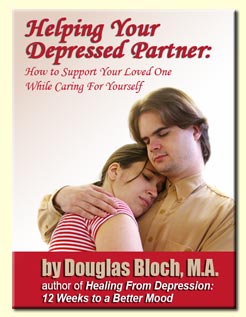
Inside the Suicidal Mind
To watch Douglas talk about what occurs inside the suicidal mind, click below.
One of the reasons I created this website was to give people support around the issue of suicide, which is the tenth leading cause of death in America, and the third leading cause of death among young adults. Based on my experience with suicide and the experience of my clients, I believe that the vast majority of these deaths can be prevented if more people understand what a person is thinking and feeling when he or she is suicidal.
To assist in building this awareness, I want to talk about three things that go on inside the suicidal mind.
Let’s start with number one: The main driving force behind suicide is the feeling of hopelessness. And these hopeless thoughts and feelings are usually the result of intense, unremitting pain that seems to have no end. Not only is the pain of depression unbearable, to the suicidal mind, it feels as if it will last forever.
Compare this other people in life-or-death survival conditions. The critically ill heart patient expresses his faith in his upcoming surgery by making a date to play golf six weeks after the operation. The soldier who is a prisoner of war dreams of one day being reunited with his wife and family. But the depressed person sees no viable future. There is nothing to look forward to, no dreams to fulfill, only the never-ending agony of the eternal present. In this context, the suicidal mind sees suicide not as an act of self-destruction, but as an act of self-love.
This brings us to point #2. These feelings of hopelessness, no matter how real they may seem, are not true. When I was suicidal I was absolutely convinced that I would not ever get better. When people told me that recovery was possible, I said, “You don’t understand! My intuition and every fiber of my being are telling me that there is no way out.” Well, guess what? I was wrong. My disregulated brain was playing a trick on me. The biochemical imbalances in my brain created a delusional state, the same as if I had taken a psychedelic drug that produced visual hallucinations. Of course, I could only see this after I had come out the other side.
The moral of the story is that when you are in an extreme emotional state, you can’t always trust your feelings. Feelings of hopelessness, now matter how real they may seem, are not true. This is because of point #3
#3 Nothing, including suicidal feelings lasts forever. The only thing constant in this world is change. Think back to a time when you were happy? At some point that experience ended and changed into something else. Well the same thing is true for feelings of pain—they too are impermanent. Thus, if you are feeling suicidal the best thing you can tell yourself is, “This, too shall pass.” Say it to yourself again and again until it becomes a mantra in your brain. This too shall pass, this too shall pass?” And then one day, you will wake up and it will no longer be Groundhog Day (a reference to the Bill Murray movie).
Of course, telling yourself that this too shall pass is easier said than done. This is where reaching out for support becomes critical. We need other people to hold a vision of our recovery; we cannot do it alone. Every member of my support group who was suicidal and asked for help is alive today.
I would like to conclude this with a personal message for anyone who is reading this who is suicidal or who knows someone else who is suicidal.
If you are on the edge of the abyss, don’t jump.
If you are going through hell, don’t stop.
As long as you are breathing, there is hope.
As long as day follows night, there is hope.
Nothing stays the same forever.
Set an intention to heal, reach out for support, and you will find help.

Thank you for taking the time reading to read this page. If you know of anyone who is having a suicidal crisis, click here for a list of suicide hotlines.
Click here to download an e-book on caring for your depressed partner.
Helping Your Depressed Partner: How to Support Your Loved One While Caring For Yourself
In this groundbreaking e-book, Douglas will explain how you can spot depression in your partner and how to help him or her seek effective treatment. In addition, much of this material can be used to help a loved one who suffers from anxiety or bipolar disorder. It is Douglas’s wish that this information may empower you to bring hope and healing into your partner’s life.

